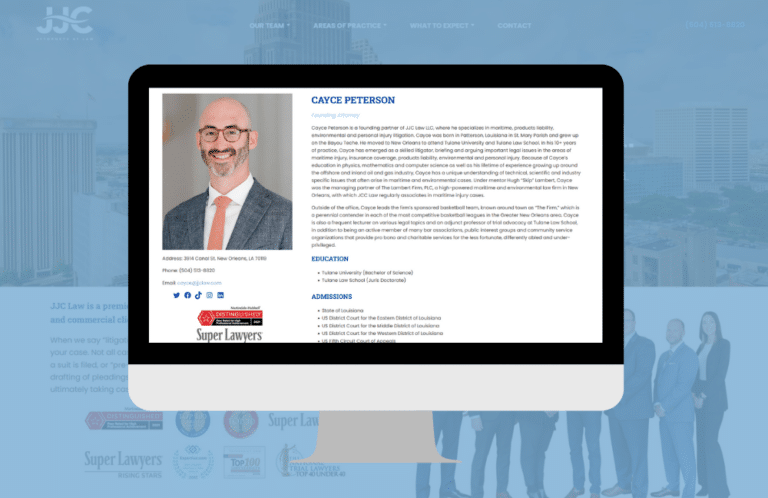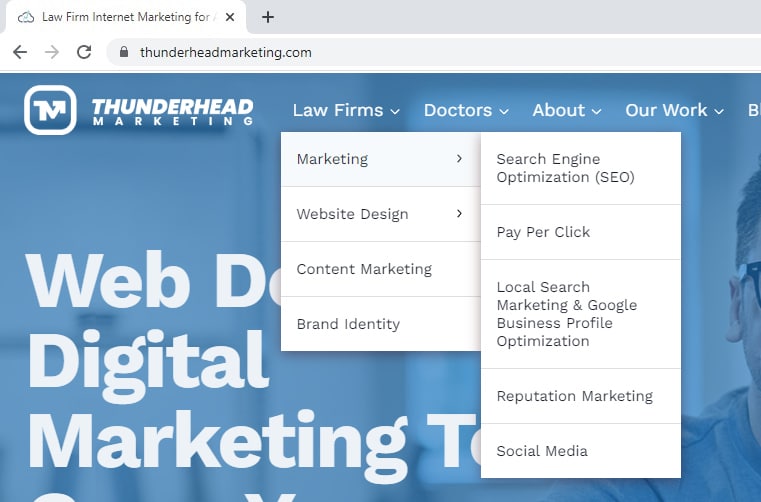Online marketing has become an integral part of any successful business. Law firms are no exception. With the competition getting tougher by the day, it is essential for law firms to have a robust web presence. But with so many options available, it can be challenging to know where to start and what to do.
In this blog post, we will cover everything you need to know about online marketing for law firms, from understanding its importance and core components of effective strategies to common mistakes that should be avoided. So fasten your seatbelts and get ready to take your law firm’s online marketing strategy to the next level!

Core Components of Effective Online Marketing Strategies for Law Firms
Statistics show that a staggering 96% of those looking for legal help turn to search engines; of these, 74% will then visit a law firm’s website with the intention of taking action. These numbers underscore how online visibility can play a significant role in attracting potential clients.
An effective online marketing strategy for law firms consists of several key components:
1. Defining Your Marketing Goals
To effectively navigate the online marketing landscape, it is crucial for law firms to define their marketing goals. This involves setting measurable objectives that can be used to gauge the success of their online marketing efforts. For example, a law firm may set a goal of increasing website traffic by 20% within six months or generating a certain number of leads per month. By clearly defining these goals, law firms can tailor their online marketing strategies to achieve them.
Additionally, establishing realistic timelines and milestones for achieving results is important. Regular evaluation and adjustment of strategies based on data and analytics will allow law firms to optimize their online marketing campaigns for the best results.
2. Identifying Your Target Audience
For law firms to have a successful online marketing plan, they need to know who they’re trying to reach. This means figuring out the type of people who need their services. Law firms should think about the age, location, and interests of these people. By using online tools, firms can see how these potential clients look for lawyers on the internet and what topics they’re interested in.
It’s also a good idea for firms to see what their competitors are doing online and find areas that might be missed. With this information, law firms can make their online ads and content more appealing to the right people, helping them get more clients
3. Building a High-Performance Website
When designing a website for your law firm, it’s important to think about the user’s experience. Make sure the site is easy to use and navigate, so visitors can find what they’re looking for. Given that many people use their phones to browse, your website should work well on mobile devices too. Use clear images and simple content to show your expertise, and have clear prompts that guide visitors on what to do next. Also, remember to update your site regularly to keep it running smoothly and staying current.
4. Harnessing the Power of Search Engine Optimization (SEO)
Boost your online presence by tapping into the magic of Search Engine Optimization (SEO). Kick things off by finding the keywords potential clients are using to search for attorneys with your practice area. Next, refresh your website’s content and meta tags to align with these keywords.
Tools like Google Analytics are your friend to monitor how your efforts are going. Keeping up with the newest SEO insights ensures you’re always one step ahead, pulling in more clients. Never forget, SEO is the backbone of digital marketing, so power up your online game with solid SEO techniques.
5. Implementing Pay Per Click (PPC) Advertising
Pay Per Click (PPC) advertising for your law firm should consist of highly targeted campaigns that reach the right potential clients. Start by choosing relevant keywords and creating compelling ad copy. Set a budget and constantly monitor campaign performance to maximize return on investment (ROI). To further enhance your PPC strategy, consider adding in remarketing techniques to re-engage with previous website visitors and encourage them to take action. Continuous optimization and refinement of your law firm PPC campaigns ensures better results over time.
6. Leaning on Content Marketing
By creating valuable and informative content, such as blog posts, articles, and whitepapers on relevant legal topics, law firms can showcase their expertise and build trust. Sharing this content through social media platforms like Facebook, LinkedIn, Twitter, and Instagram allows for wider reach and exposure.
Repurposing content into different formats, such as videos or podcasts, enhances engagement and appeals to different audiences. Incorporating content marketing into a law firm’s marketing plan can yield the best results, attracting new clients and amplifying word-of-mouth referrals. It takes online marketing efforts to the next level by providing informative resources that potential clients seek in their search for legal services.
7. Making Use of Social Media Platforms
With the vast majority of people using social media, incorporating it into your marketing plan can take your online marketing for law firms to the next level. Engaging potential clients on social media is essential to increase visibility and reach. Take advantage of targeted ads on platforms like Facebook, LinkedIn, Twitter, and Instagram to reach your desired audience effectively.
Share valuable content and resources to establish your law firm as an authority in your practice area. Interact with followers and promptly respond to inquiries to build trust and credibility. Don’t forget to use social media analytics to track the effectiveness of your campaigns.
8. Harnessing Email Marketing
Building an email list allows law firms to stay connected with both existing and potential clients, fostering a meaningful relationship. By sending regular newsletters filled with informative content and updates about the firm, attorneys can nurture trust and demonstrate their expertise.
Personalizing email campaigns makes them more engaging and relevant, increasing the likelihood of client interaction. Email automation is a valuable tool that saves time and ensures timely messages are delivered to subscribers. Monitoring open and click-through rates provides valuable insights into the effectiveness of email marketing efforts. Incorporating these strategies into a comprehensive online marketing plan can elevate a law firm’s digital presence and attract new clients.
9. Encouraging Client Reviews and Testimonials
Reputation management is an absolute must for all attorneys and law firms. Reviews and testimonials from satisfied clients can be showcased on your website and social media platforms, increasing your credibility. It’s important to respond to both positive and negative reviews in a professional and timely manner, showing that you value client feedback.
Request that clients leave reviews on popular sites like Google and Yelp, as this can further boost your online presence. By actively encouraging client reviews and testimonials, you can build trust and attract new clients to your law firm.
10. Tracking Your Return on Investment (ROI)
To effectively track the success of your online marketing campaigns, utilize tracking tools like Google Analytics. This allows you to monitor key metrics such as website traffic, conversion rate, and cost per lead. By calculating the return on investment for each marketing channel, you can optimize your budget and allocate resources where they provide the best results.
Set specific goals and objectives for your online marketing efforts to track progress and make adjustments accordingly. Regularly analyzing your strategies based on ROI data will help you take your internet marketing efforts for law firms to the next level.

Common Mistakes in Law Firm Online Marketing and How to Avoid Them
Now that we’ve gone over everything a law firm should do in its online marketing efforts, let’s review a few of the mistakes to avoid.
1. Misunderstanding Your Potential Clients’ Needs
To effectively market your law firm online, it is crucial to understand the needs and preferences of your potential clients. Thorough research on your target audience will provide valuable insights into what they are looking for and how you can address their concerns.
Avoid using legal jargon or technical terms that may confuse or alienate your audience. Instead, focus on creating content that is informative, engaging, and easy to understand. Don’t resort to overly aggressive or misleading tactics in your marketing efforts as it can damage your reputation. Provide value to your audience by offering free resources such as e-books, webinars, or consultations.
2. Relying on Traditional Marketing Methods
While it’s important not to ignore the power of online marketing for law firms, many still rely solely on traditional marketing methods like print ads and billboards. While some people may still turn to the Yellow Pages when they need to get information, most people will turn to the internet to get the information they need. Depending on your target market, it may make sense to still utilize some traditional marketing strategies, but they should be used along with digital marketing efforts.
3. Not Diversifying Web Strategies
We often see law firms that do recognize the importance of being online, but make the mistake of relying only on one avenue of digital marketing, such as SEO. It is important to diversify web strategies by exploring other channels like social media, PPC advertising, and email marketing. Neglecting the importance of branding and reputation management can also hurt your online marketing efforts.
4. Ignoring the Significance of Online Reviews
Online reviews can make or break a law firm’s online marketing efforts. Positive reviews act as social proof and can greatly influence potential clients’ decision-making processes. To encourage clients to leave positive reviews, law firms can request feedback, provide exceptional service, and maintain open lines of communication. Responding to negative reviews in a professional and constructive manner is equally important. It demonstrates a commitment to addressing client concerns and shows potential clients that the firm values their feedback. Online reviews have an impact on search engine rankings, with positive reviews contributing to better visibility.
5. Inconsistency in Your Online Marketing Strategy
Inconsistency in online marketing can confuse potential clients and diminish the trust they have in a law firm’s brand. If a law firm frequently changes its messaging, branding, or approach, it can create an impression of instability or lack of clarity in its services. A consistent approach not only reinforces the firm’s reputation but also strengthens its online presence, ensuring that potential clients receive a clear and uniform message each time they encounter the firm online. Failing to maintain this consistency can result in missed opportunities and decreased client engagement, ultimately impacting the firm’s bottom line.
6. When the Economy Is Down, Marketing Should Be Up
When the economy is struggling, many attorneys feel like they should cut back on marketing expenses in an effort to save money. In reality, this is the time to ramp up marketing efforts. During economic downturns, clients become more selective with their spending and are likely to seek legal assistance only when they absolutely need it. By increasing marketing efforts, law firms can stand out from the competition and gain a larger share of these limited client opportunities.
A strategic marketing plan can help position a law firm as a trusted and reliable resource, even during economic downturns. It allows the firm to showcase its expertise, build credibility, and establish a strong online presence.
Working with a Marketing Agency: Is it Necessary for Law Firms?
We know that all sounds like a lot of work, right? The good news is that you don’t have to do it alone — in fact, for most law firms, outsourcing online marketing is one of the easiest decisions they will ever make to grow their practice.
Working with a marketing agency can be a game-changer for law firms looking to enhance their online presence, but not all online marketing companies understand how to best serve the legal industry. When selecting a marketing agency for your law firm, here are a few things to consider:
- Their experience and track record in online marketing specifically for law firms.
- Their understanding of the legal industry and their ability to target your audience effectively.
- Their digital marketing strategies and the results they have achieved for other law firms.
- Transparency and clear communication in their collaboration approach.
- Their ability to provide tailored solutions that align with the unique needs of your law firm.
By choosing the right marketing agency, you can ensure that your online marketing efforts yield the best results.
Get Help Taking Your Law Firm’s Online Presence to the Next Level
Navigating the world of online marketing can be a delicate process, but with the right partner, success is just around the corner. If you’re committed to maximizing your firm’s online presence and want to avoid common pitfalls, Thunderhead Marketing is here to guide you every step of the way.
Don’t leave your firm’s growth to chance. Contact Thunderhead Marketing today and let us craft a strategy tailored to your law firm. Reach out now and watch your firm thrive!







